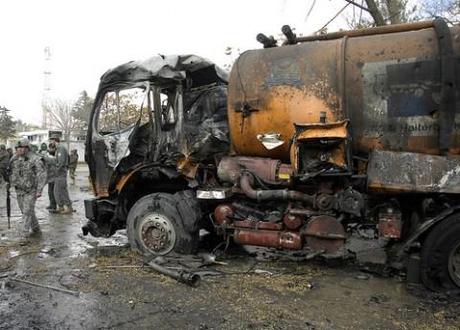
The remains of a truck after an explosion in Kabul, 2009 photocredit: isafmedia http://www.flickr.com/photos/isafmedia/3203441912/
As many as nine suicide bombers have attacked a British Council building in the Afghan capital, Kabul. They’ve killed at least eight people (most thought to be Afghan policemen), injured at least ten, and have taken over the compound, exchanging fire with Afghan Special Forces (trained by the New Zealand SAS) and Nato security forces. Four of the attackers are also reported to have been killed. The British Council sits opposite the ruins of the old British Embassy, and is guarded by Nepalese Gurkhas. Officials are worried about still further attacks.
According to the Taliban, who immediately claimed responsibility for it, the attack marks the 92nd anniversary of Afghan independence from Britain in 1919. This is a public holiday which commemorates the signing of the Treaty of Rawalpindi, which recognised Afghan sovereignty, and allowed the country control of its own foreign policy.
The attack took place in three phases: a suicide bomber detonated himself in a square in the Kart-e-Parwan area of Kabul; then a car bomber exploded in front of the British Council. This was followed by up to nine attackers, heavily armed, who stormed the building.
The Washington Post quoted a US military official: “The good news is that the British nationals that were in the compound made it to the safe room and they are alive and well in it. The Gurkhas put up a good fight and they were able to push the attack back.” This came as the BBC reported that British troops’ supply lines in Afghanistan could fail as well.
- Trouble was brewing. It’s not the first time, said Bilal Sarwary on BBC News, that an attack’s happened on Afghanistan’s “Independence Day.” The attackers fought for hours; it happened even after intelligence suggested there would be trouble. The Daily Telegraph quoted Zabihulla Mujahid, a Taliban spokesman: “Now the British have invaded our country again and they will recognise our independence day again.”
- So what does the British Council do? Peter Walker in The Guardian looked into the role of the British Council. It came back to Afghanistan in 2002 (having left two decades previously after the Soviet invasion). Its main aim is to teach English. It also helps the Afghan civil service, running a Foreign Office scholarship scheme, and emphasises the need for education of women. Matthew Holehouse in The Daily Telegraph added that officially the British Council is independent of the government, but is often regarded by foreign powers as a “front for espionage.”
- Yikes! Steve Clemons, a political blogger on The Washington Note, tweeted: “Yikes. Big explosion just occurred in Kabul. Shook my hotel. Dont know what it was — bomb, rocket, not sure.”
- This will affect the army’s withdrawal. David Blackburn on The Spectator said “Afghanistan still has the capacity to shock.” The Taliban hasn’t explained why they targeted the culturally-orientated British Council. “It remains to be seen if this was a botched targeted assassination, of the sort executed on Ahmed Wali Karzai last month.” This attack renews questions about Afghan forces’ ability to keep order with Nato. It’s been a month since Nato gave responsibility to them. This attack “might affect the pace and extent of western military withdrawal in the immediate future,” yet it also might “stiffen the resolve of many in the US Congress to get the hell out of there as soon as possible.”

